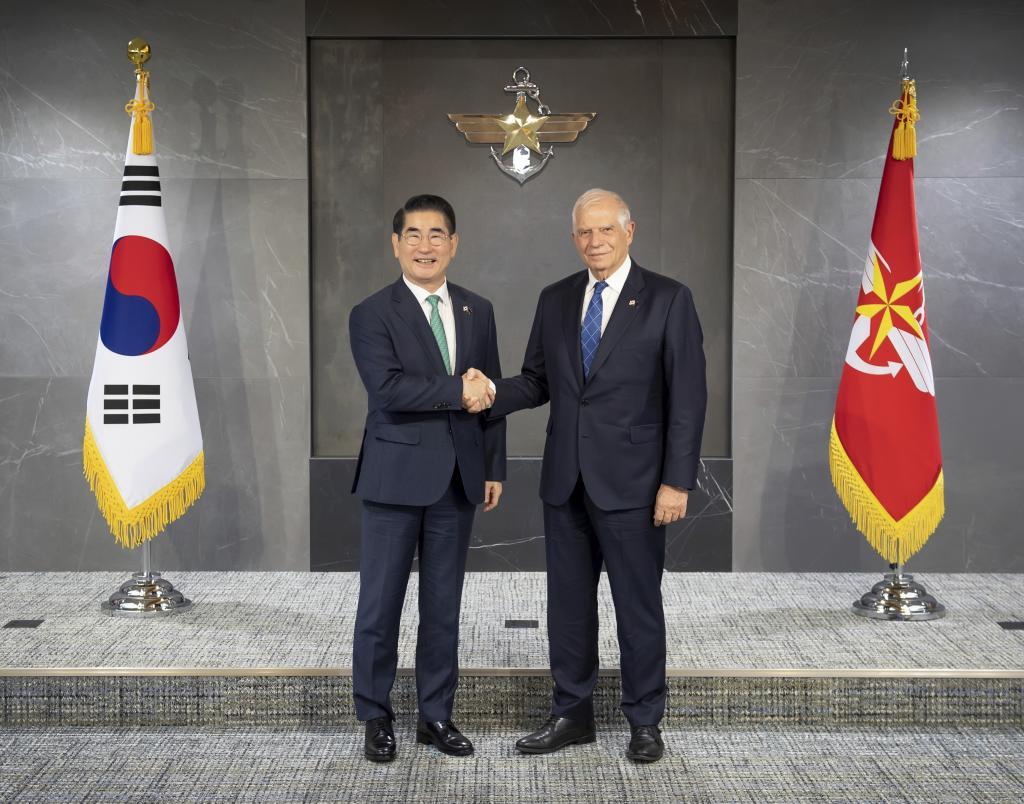Top South Korean and European Union officials on Monday strongly condemned North Korea's reported troop dispatch to aid Russia's war against Ukraine and agreed to work together to try to block deepening military cooperation between Moscow and Pyongyang.
North Korea's alleged troop deployment threatens to expand the almost 3-year-long war and is causing security jitters in South Korea, where many worry Russia might reward the North by giving it sophisticated weapons technology or offering a defense commitment in the event of a conflict on the Korean Peninsula.
In a meeting in Seoul, South Korean Defense Minister Kim Yong Hyun and the EU's visiting foreign policy chief, Josep Borrell, expressed "serious concerns" about North Korea's reported troop dispatch and "strongly condemned" it, according to a statement from the South Korean Defense Ministry.
The two agreed to work together with the international community to try to obstruct Russian-North Korean security cooperation, the statement said.
The U.S. government said Thursday that about 8,000 North Korean soldiers were in Russia near Ukraine's border and preparing to join Russia's fight against Ukraine in the coming days. Ukraine's President Volodymyr Zelenskyy on Friday urged allies to stop just "watching" and take steps before North Korean troops deployed in Russia reach the battlefield.
According to U.S., South Korean and Ukrainian intelligence assessments, North Korea was estimated to have moved about 10,000-12,000 troops to Russia. If they start fighting against Ukraine forces, it would mark North Korea's first participation in a large-scale conflict since the end of the 1950-53 Korean War.
North Korean leader Kim Jong Un has used the Russia-Ukraine war as a way to expand defense and economic cooperation with Russia in the face of an intensifying U.S.-led pressure campaign against his advancing nuclear program. The U.S., South Korea and others accuse North Korea of having already exported artillery shells, missiles and other conventional arms to Russia.
In the past two years, Kim has also ramped up tests of nuclear-capable missile systems, as Russia and China have repeatedly blocked U.S.-led attempts to toughen international sanctions on North Korea over its testing activities in defiance of U.N. bans. North Korea has also pushed to sever relations and abandon its long-standing goal of reconciliation with South Korea.
In a background briefing with local media Monday, South Korea's military said North Korea has built anti-tank, trench-like structures at two sites near the Koreas' heavily armed border, where it blew up northern parts of unused cross-border road and rail routes last month in a display of anger toward South Korea. One of the sites is on the western portion of the border and the other on the eastern section.
Details of the briefing were shared with The Associated Press.
The structure at the eastern part of the border was assessed to be 160 meters (524 feet) long while the one at the western part of the border was about 120 meters (393 feet) long, according to the South Korean military briefing.
In a war situation, the North could easily fill up the trenches with piles of dirt nearby to create routes to invade the South, according to the Joint Chiefs of Staff.
Recent commercial satellite images suggest that the work on the trenches began shortly after North Korea staged choreographed demolitions of a road near the western North Korean border city of Kaesong and a combined road and rail section near the Koreas' eastern border on Oct. 15.
Last week, North Korea test-launched an intercontinental ballistic missile designed to attack the U.S. mainland for the first time in almost a year.
